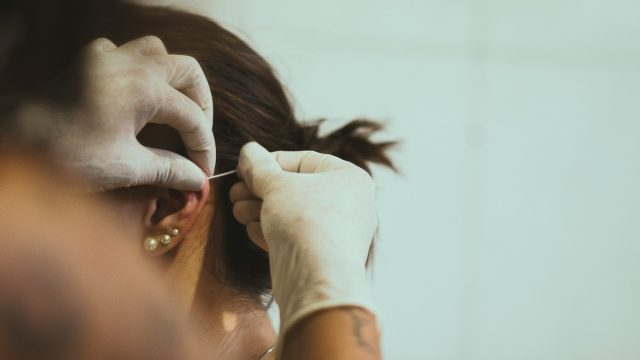This Is Why We Pierce Our Ears

If leaving the house without a pair of earrings on feels akin to walking outside half-nude, you’re not alone. While there are few definitive statistics on the matter, it’s frequently reported that between 80 and 90 percent of American women have their ears pierced, with a growing population of men joining that number. But one question remains: Why do we pierce our ears at all?
While body modifications may seem like a relatively new trend to the uninitiated, ear piercing has been a global tradition for millennia. In fact, Ötzi, a man thought to have died around 3300 B.C.E.—whose mummified remains were found in the Europe’s Ötzal Alps in 1991—not only had pierced ears, but had stretched his ear lobes, as well. (These days, widely stretched ear-lobe holes due to piercing are known as “gauges.”)
What’s more, though it’s well-established that individuals have been adorning their ears with jewelry for thousands of years—there are even mentions of earrings in the Bible—the reasoning behind the choice to do so is significantly linked to the particular culture of whomever is getting their ears pierced.
The most common reason behind this particular form of body modification is simple: It was once a means of identifying individuals as upper-class or even nobility, specifically during Egypt’s Thutmosid Dynasty (1549 to 1292 B.C.E.), the Bronze Age Minoan Civilization, and in both ancient Rome and ancient Greece. Members of the ruling class would adorn their ears with jewels and precious metals, or pendants in the form of deities, to indicate their status.
While earrings eventually lost ties with nobility throughout Europe by the 16th century, it was during this time that men increasingly started wearing them, largely as a fashion statement. Sailors were among the groups who pioneered this trend among men, with many sailors given their first piercing to commemorate their initial crossing of the equator—the reason we associate earrings with pirates today.
However, earrings eventually fell out of fashion, with both Europeans and North Americans piercing their ears less by the early-to-mid 20th century, when clip-on earrings overtook their pierced counterparts in terms of popularity. It wasn’t until the 1960s that earrings once again saw an uptick in popularity in the United States, with members of American counterculture movements, like hippies, leading the charge.
Today, while most ear piercings in the United States are done primarily for the sake of fashion, there are still cultural traditions influencing the practice—especially among young children. Hindu children, both male and female, will often have their ears pierced as part of the Karnavedha ceremony, one of the religion’s rites of passage. Piercing also remains a fixture in Latin American countries, and among Latinx groups in the United States, with girls frequently getting their ears pierced in infancy as a cultural tradition.
So, what’s behind the push to pierce for everyone else?
“Some people like the aesthetics, for some people it’s tradition, and for some people it hinges widely on gender roles,” says Victoria Rothman, a piercer at Graceland Tattoo in Wappingers Falls, New York. “For a lot of older piercers, it was rebellion, but now, as it moves into the mainstream, it’s not so much that anymore.”
And as for where people prefer to have their piercings done these days, most folks are looking past the kiosk at their local mall. “The Association of Professional Piercers works pretty actively at steering children away from having their ears pierced in malls with piercing guns,” says Rothman, noting the detrimental effects of the practice, from lopsided piercings to tissue damage. “There’s been a huge influx in parents bringing their children to tattoo shops instead.” And if you’re thinking about some body modifications of your own, check out these 100 Amazing Tattoos for First-Timers.
To discover more amazing secrets about living your best life, click here to follow us on Instagram!